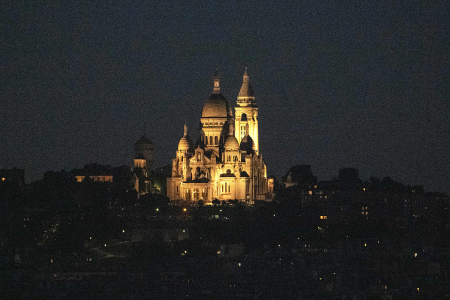Paris goes dark day after 'debauched' Olympics opening ceremony mocks Last Supper

Parts of Paris, France, were struck with a blackout over the weekend, just 24 hours after the Olympics drew global backlash for its opening ceremony that detractors claimed mocked Christianity and the Last Supper with drag queens.
Approximately 85,000 Parisians in four districts were affected by the blackout that lasted for about 10 minutes at 11:40 p.m. on Saturday night, which the electricity supplier Enedis chalked up to "a technical anomaly," according to Le Parisien.
Footage of the blackout went viral on social media, with many users also pointing out the striking image of the Basilique du Sacré-Cœur de Montmartre (Basilica of the Sacred Heart of Montmartre) remaining brightly lit amid the darkness.
During the power outage in Paris, notice the thing that’s still fully lit: Sacre Coeur Church.
— Robby Starbuck (@robbystarbuck) July 28, 2024
Zoom in on the dark photo.
Incredible find by @GalahadofMalta, especially in context of the Olympics anti-Christian opening. pic.twitter.com/g1KPRzrone
Many users suggested a symbolism in the timing of the blackout, which came a day after the widely-panned Olympic Opening Ceremony in Paris last Friday.
The ceremony — which featured a bearded drag queen, exposed male genitalia and a self-described "fat, Jewish, queer lesbian" woman named Barbara Butch in the place of Jesus at a tableau resembling the Last Supper — drew widespread criticism for its pagan symbolism that many claimed was an attempt to mock God.
"The irony of an electrical power outage in Paris in the wake of the blasphemous & debauched opening ceremonies of the Olympics should be noted. The evil on display mocks God’s power and then the city is left powerless," Bishop Emeritus of Tyler Joseph Strickland tweeted.
"May the Sacred Heart of Jesus guide us in His powerful Light," he added.
The irony of an electrical power outage in Paris in the wake of the blasphemous & debauched opening ceremonies of the Olympics should be noted. The evil on display mocks God’s power and then the city is left powerless. May the Sacred Heart of Jesus guide us in His powerful Light. pic.twitter.com/zbATrUTfeT
— Bishop J. Strickland (@BishStrickland) July 28, 2024
The opening ceremony that stoked outrage featured a scene reminiscent of Leonardo da Vinci's "The Last Supper," the iconic depiction of Jesus' last meal with His disciples before His death and resurrection.
The song “King” played loudly as a lesbian wearing a crown was depicted as Jesus surrounded by men in drag, one of whom was a bearded man with long, blonde hair who later danced suggestively down a catwalk, much like a stripper would do. The catwalk was in front of the Last Supper table, where a young girl stood near the men in drag.
At the center featured Butch, who posed nude on the cover of the French weekly magazine Télérama in 2020, according to the Jewish Chronicle.
In a statement released Monday, Butch's attorney Audrey Msellati claimed her client "has been the target of an extremely violent campaign of cyber-harassment and defamation."
"She has been threatened with death, torture, and rape, and has also been the subject of numerous anti-Semitic, homophobic, sexist, and grossophobic [anti-fat] insults."
The attorney went on to claim that Butch values "benevolence, inclusivity, and love," and that she intends to file complaints and prosecute people who try to intimidate her.
When the image first went viral comparing the opening ceremony's trans tableau to the Last Supper, Butch shared an Instagram post that said, "Oh yes! Oh yes! The New Gay Testament!" Butch described the tableau in a subsequent Instagram post simply as "the feast of the gods."
Barbara Butch, the woman in the center, posted this photo to her instagram, admitting that this photo had everything to do with them mocking the scriptures.
— Sarah Fields (@SarahisCensored) July 28, 2024
She then deleted it a few hours later and called it “the feast of the Gods”.
Nope. Caught. pic.twitter.com/IhyREuYlU5
After the ceremony drew scorn from Catholic bishops, politicians and others, including billionaire Elon Musk, Paris 2024 spokesperson Anne Deschamps issued a statement claiming, "clearly there was never an intention to show disrespect to any religious group," according to The Telegraph.
The opening ceremony, she added, "tried to celebrate community tolerance. … We believe this ambition was achieved. If people have taken any offense we are really sorry."
The supposed apology itself also drew criticism from figures such as Barron, who blasted it as "anything but an apology" and "a masterpiece of woke duplicity."
Thomas Jolly, the artistic director of the ceremony, defended the presentation amid the firestorm, claiming that the scene was not meant to mirror "The Last Supper," but rather instead to show a pagan feast celebrating the gods of Olympus such as Dionysus, who featured as a man on the table painted blue.
"The idea was to do a big pagan party linked to the gods of Olympus," Jolly told the Paris-based BFM network, according to France 24. "You’ll never find in my work any desire to mock or denigrate anyone."
The organizers appeared to contradict Jolly in a statement to The Wrap.
"[Jolly] is not the first artist to make a reference to what is a world-famous work of art," Paris 2024 told the outlet. "From Andy Warhol to 'The Simpsons,' many have done it before him."
French singer and actor Philippe Katerine was shown during the Last Supper tableau reclining on a dinner platter, symbolizing the pagan god Dionysus. In Greco-Roman culture, Dionysus was a nature god of fruitfulness and vegetation, as well as wine and ecstasy, according to the Encyclopedia Brittanica. Mention of him extends to the earliest period of ancient Greek history, and his rites often included drunken orgies.
Jon Brown is a reporter for The Christian Post. Send news tips to [email protected]






















